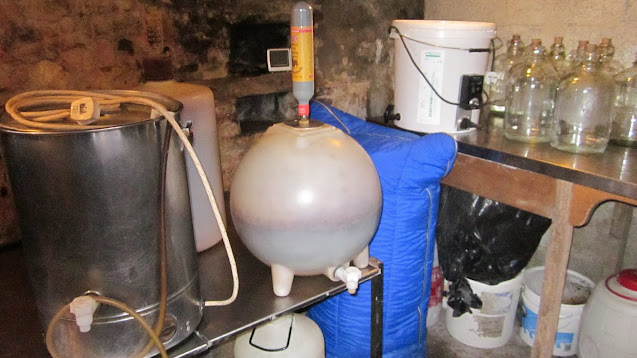Beers from a bygone era
When I stumbled across Boak and Bailey's blog about Pollards : Only a northern brewer it took me down memory lane to when I first started brewing with all grain. It was Autumn 1982. I had just bought a house in Withington, South Manchester. I could do what I liked, without disturbing or disturbance from shared accommodation house-mates. I had got a second hand Baby Burco boiler, formerly used for nappies, and plastic buckets and 20 litre snap lid containers.
 |
| My brewery in the garage |
My first Baby Burco on the left, on it's third element, is now relegated to heating sparge water. In the middle is my last remaining beer sphere, Peco mash tun and demi-johns. Inside the blue sleeping bags there is 10 gallons of beer in the final stages of primary fermentation.
I bought my ingredients from Hillgate Brewing Supplies in Stockport, the shop mentioned by Boak and Bailey. It must have been just after the shop had changed hands from Pollard. The man running it was John Hoskins, if my memory serves me right. I would phone in an order: "Two of page 88 please" and pick it up the next day. He would make up recipes from David Line's "Brewing Beers Like Those You Buy", which was a boon for a novice brewer without any scales.
That book and it's brother "The Big Book of Brewing" were my guides throughout my initial brewing experiences. I had developed a taste for traditional cask conditioned ales as championed by CAMRA, and was determined to make my own beers like that.
 |
| The books |
With the repeal of the brewing license laws in 1963 by Reginald Maudling home brewing beer became popular. David Line was a pioneer in small scale domestic, kitchen, beer brewing. He developed a lot of techniques and went on to try and recreate recipes like the commercial beers.
When we first moved up to Orkney I thought that I should get new copies of these books, as the old ones were getting a bit battered. I bought them on-line which gave me the opportunity to review them, which I did with glowing praise. A few months later I checked the reviews again to see what others had said. There was a comment for TBBoB: "This guy recommends fermenting in a trash can! Eugh, I don't think I'll bother with it!" or words to that effect.
A review for BBLTYB said "I've tried brewing three of these beers, and not one of them tastes anything like those you buy." Actually they were quite right. But they had completely missed the point that it was the beers that they bought that had changed over those 22 years and not the recipes.
So if any of you readers want to try making beers and ales like they used to taste in the 1970s and 1980s I recommend BBLTYB. I lent it to a friend who was also starting up brewing at that time. He recommended:
86 Eldridge Pope : "Royal Oak"
87 Fullers : "London Pride"
91 Greene King : "Abbott Ale"
I tried the following beers with success:
88 Gales : "HSB" still my favourite. Now I add 1/2lb of flaked oats for the mouth feel. I never did add the saccharine.
94 Hook Norton : "Old Bill"
109 Shepherd Neame : "Best Bitter"
142 Stella Artois
148 Grolsch
I can still remember Stella Artois changing in the late 1980s, so that I would only buy imported Stella. That made in the UK was just not the same. Come to that when I bought some cans of Guinness five years ago, it was just not right either. To me it is so sad that these traditional beers, lagers and ales have changed their manufacturing methods and now taste nothing like their original forefathers.
Fashions change. American citrus hops have become popular, Mango IPA and other exotic recipes, all these leave me cold. I prefer the old traditional British cask conditioned ales, and so I will continue to brew my own.
On a completely different tack, I have been wondering why it is that Merryn and I have so much difficulty in explaining the science and biochemistry of malting, mashing and fermentation to archaeologists.
David Line was an Electrical Engineer, as was my father. He was one of the engineers involved in building the National Grid after the 2nd world war, and he used to make hedgerow wines at home. I used to be a Computer Systems Engineer and I am from a scientific/engineering background. I wonder how many other brewers have a science background and if there are any with a humanities background.
I wonder if C.P. Snow's concept of two divided cultures (Two Cultures) has something to do with this communication gap. Archaeologists, anthropologists and sociologists are all usually from a humanities background. Maybe they see things completely differently from myself and other engineers. When
I try to explain a scientific fact to an "ologist" they often tell me it is
just an opinion. In the absence of corroborative evidence from their
own literature it cannot be considered significant. Whereas to me it is a truth, like gravity and other phenomena.
Graham Dineley
No comments:
Post a Comment